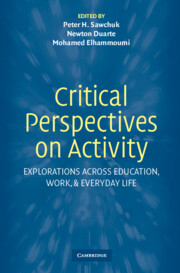Book contents
- Frontmatter
- Contents
- List of Contributors
- Foreword by Seth Chaiklin
- Acknowledgements
- 1 Introduction: Exploring Activity Across Education, Work, and Everyday Life
- SECTION I CRITICAL PERSPECTIVES ON THEORY
- SECTION II EDUCATION
- 5 The Importance of Play in Pre-School Education: Naturalisation Versus a Marxist Analysis
- 6 Estranged Labor Learning
- 7 “Our Working Conditions Are Our Students' Learning Conditions”: A CHAT Analysis of College Teachers
- SECTION III WORK
- SECTION IV EVERYDAY LIFE
- References
- Index
7 - “Our Working Conditions Are Our Students' Learning Conditions”: A CHAT Analysis of College Teachers
Published online by Cambridge University Press: 10 December 2009
- Frontmatter
- Contents
- List of Contributors
- Foreword by Seth Chaiklin
- Acknowledgements
- 1 Introduction: Exploring Activity Across Education, Work, and Everyday Life
- SECTION I CRITICAL PERSPECTIVES ON THEORY
- SECTION II EDUCATION
- 5 The Importance of Play in Pre-School Education: Naturalisation Versus a Marxist Analysis
- 6 Estranged Labor Learning
- 7 “Our Working Conditions Are Our Students' Learning Conditions”: A CHAT Analysis of College Teachers
- SECTION III WORK
- SECTION IV EVERYDAY LIFE
- References
- Index
Summary
INTRODUCTION
“Our working conditions are our students' learning conditions.” This claim has been made again and again by contingent (adjunct, part-time, temporary, non-tenure track, or non-“regular”) faculty in adult and higher education in the United States, usually in the course of some part of a union organizing or bargaining campaign. It is both a protest against working conditions that undermine effective teaching and a declaration of intent to organize to improve those conditions.
It also indicates that, from the point of view of contingent faculty, the interests of the faculty lie increasingly with their students rather than with the institutional management that has command of those conditions.
This distinction between the interests of faculty and of institutional management, as we will explain, has emerged progressively over the last thirty years as the adult and higher education workforce has undergone a shift from majority tenured and tenure-track to majority contingent. However, this distinction is invisible to many. Furthermore, this invisibility is itself promoted, asserted, and promulgated, often in the name of “quality.” The argument goes that the interests of the institution and of faculty, meaning both tenured and contingent faculty, are identical because institution and faculty alike are committed to offering the best possible educational “quality” experience to their students. The key is that what “quality” means depends on what purpose one is serving.
- Type
- Chapter
- Information
- Critical Perspectives on ActivityExplorations Across Education, Work, and Everyday Life, pp. 123 - 142Publisher: Cambridge University PressPrint publication year: 2006
- 4
- Cited by



